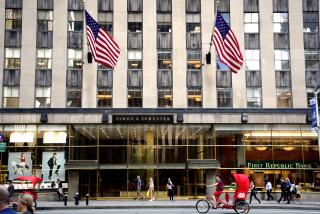German Publisher Set Out to Be the Best, Turned Into World’s Biggest
- Share via
GUETERSLOH, West Germany — At first glance, this modest town in northern Germany seems an unlikely place for the headquarters of the world’s largest media empire. Guetersloh is out of the way, to say the least.
There is no major airport within 100 miles, and the express trains don’t stop here. Signs at the railway station warn waiting passengers to watch out for the fast trains roaring past.
But a mile or so from the station stand the executive offices of Bertelsmann AG, a firm with annual sales of $6.3 billion. Bertelsmann’s activities range from printing German encyclopedias to selling the recordings of Whitney Houston and the memoirs of Lee Iacocca.
Founded here 153 years ago, Bertelsmann made its mark on the world media scene in September, 1986, when in back-to-back deals it acquired RCA’s record division and the American publishing giant Doubleday & Co.
Those acquisitions, added to Bertelsmann’s book clubs, magazines, records and printing operations, catapulted Bertelsmann ahead of CBS Inc. and Time Inc. as the world’s largest media combine.
Recently, Bertelsmann shook up West Germany’s television establishment by bidding for the rights to telecast the games of the German soccer league, outbidding the state-controlled networks that have had a monopoly on such transmissions.
Decentralization
Bertelsmann has quietly gone from strength to strength with only a few mishaps, among them the ill-fated attempt to publish an American version of the successful German magazine Geo.
“We haven’t sought to become the biggest media company,” Mark Woessner, Bertelsmann’s chief executive, told a recent visitor. “Size only happens to be a function of our search for excellence. We would rather be the best than the biggest.”
Seated at a conference table in his second-floor office overlooking the North German plain, Woessner, who holds a doctorate in engineering, added: “The secret of our success, I think, lies in our policy of decentralization. We believe in delegating authority, allowing our managers to manage, to create their own profit centers.
“We give strategic direction from the top, but it is our managers throughout the company who make decisions. We have tried to create an entrepreneurial atmosphere here, not just for the senior managers but for all of our 42,000 employees. Our employee profit-sharing program is part of that concept.”
At present, Bertelsmann is still digesting the huge purchase of troubled RCA Records for $330 million and the ailing Doubleday for $475 million. But Woessner says he plans further acquisitions in the tempting American market, most probably in the magazine field.
With its entry into the United States and possible acquisitions in the Far East, Bertelsmann is far removed from the small firm that Carl Bertelsmann founded in 1835 to publish Protestant religious tracts and hymnals.
Its transformation into a major player on the world media scene was masterminded by Reinhard Mohn, the previous chief executive and a fifth-generation member of the founding family. Mohn, a young officer in Field Marshal Erwin Rommel’s Afrika Corps, was captured in North Africa and spent half of World War II in a prisoner-of-war camp at Concordia, Kan.
“America was Reinhard Mohn’s university,” Woessner said. “He came back to Germany much impressed by the American ideas of freedom, democracy, space and self-reliance.”
Plant in Ruins
But Mohn had also absorbed the German army’s tradition of leadership, a concept known as auftragstaktik . The unit commander is given a mission and left to plan and execute it without undue interference from his superiors. This approach, encouraging initiative and responsibility in junior officers, is credited with achieving a high level of flexibility in the German army.
When Mohn returned home, the firm’s printing plants were in ruins. He started from scratch with the novel idea of forming a book club that would involve local booksellers throughout Germany as middlemen. The business prospered, and today, in West Germany alone, Bertelsmann book clubs have 4.3 million members and operate in 280 retail centers.
To increase interest in the company and to raise capital for expansion, Mohn devised a profit-sharing scheme. And over the years he moved into record clubs and began to expand beyond West Germany’s borders.
A key decision was made in 1969 to buy a major stake in Gruner & Jahr, a Hamburg-based publisher of a string of popular magazines. Bertelsmann magazines now include Stern and Brigitte in West Germany, Parents in the United States, Prima and Best in Britain, and Femme Actuelle in France.
Mohn also built or bought printing plants for his books, and record-pressing factories, which are centered in Guetersloh and employ about 6,500. He bought the Arista and Ariola labels when the companies refused to supply records for his clubs.
Mohn, whose family owns 90% of Bertelsmann’s voting stock, infused the company with his dynamism and creativity. He hired the best people he could find and paid them well.
He also developed the company’s concepts for managerial leadership, decentralized decision-making and responsibility, and he gave his executives the latitude to make mistakes. Mohn readily admits his own mistakes, like the American Geo, which was an artistic success but failed to catch on and lost an estimated $50 million.
“It was an expensive lesson,” Woessner recalled. “We were just not prepared. We learned a lot of respect for the American media market.”
Future Vision
Of such bitter lessons, Mohn has remarked: “Anyone who tries to avoid these has not understood that businessmen have to make mistakes. This also belongs to the education of our young people. The readiness to take risks belongs to business education.”
But while managers are allowed to make mistakes, there is a limit. Ultimately they are judged by the bottom line, based on the profit projections of the executive board.
In 1981, when Mohn reached age 60, he followed his own rule and retired as chief executive, then moved up to head the company’s supervisory board. He turned the command over to his protege, Woessner, who is now 49.
Mohn was an executive of Spartan habits, but he indulges in one luxury: He built an elegant hotel in Guetersloh, a community of 80,000, and it has one of the finest kitchens in Germany.
Woessner, though not a member of the founding family, continues the tradition of energetic, far-sighted leadership. This was evident in his lightning moves to buy RCA Records and Doubleday.
At first Woessner thought that perhaps five years would be needed to integrate the two big American firms into the German operation and to sort out the management problems at Doubleday. But American profits are already above expectations, and this suggests that Bertelsmann will soon be looking for new ventures.
“Full integration of our U.S. units is moving faster than we thought,” Woessner said. “We know we will expand. Where do we go from here? We don’t know exactly. I’d like to enlarge what I call our three pillars: Germany, Europe and America. The American market is always intriguing. I think we’d like to enlarge our magazine division. The next step in America could be new products, either designed or acquired by us.
“Our strategic vision for the 1990s means aiming for an expanded magazine business in the U.S. But we would also like to develop our role in the electronic media: TV, radio, digital information. And we are looking toward the Far East as a fourth pillar for the future.
“I think we have been wise in concentrating in the media fields and away from being a conglomerate. We are now fully international, with 60% of our sales outside Germany. We will continue to emphasize decentralization, the motor of our expansion and success in the last three decades.
“We will continue our overall managerial concept: Hire the best people, give them a lot of freedom to perform and pay them a lot. I have a vision that at the end of the 1990s--I am going to retire in 1998--I would like to see Bertelsmann in a leading position in the worldwide media market. Not necessarily the leading but a leading company, recognized for its quality, for its excellence.”
More to Read
The biggest entertainment stories
Get our big stories about Hollywood, film, television, music, arts, culture and more right in your inbox as soon as they publish.
You may occasionally receive promotional content from the Los Angeles Times.










